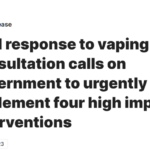Re-useable vapes will still be legal to use in France.
Regulations surrounding vaping are rapidly evolving across the globe. In particular, the European Union is experiencing a wave of changes with a sharp focus on disposable vapes and flavour bans. The dynamic landscape is seeing governments taking decisive actions to curb the increasing prevalence of vaping, particularly amongst the younger demographic.
France leads the charge against disposable vapes, aiming to obliterate the risks associated with it. This is part of a broader strategy to tackle underage vaping and mitigate the alleged ‘gateway’ effect that vaping has on traditional smoking habits. The impending ban on disposable vapes and attractive flavours considered a lure for teenagers, signals a tectonic shift in the vaping industry and health regulations in the EU.
France’s plan to ban disposable vapes
France’s plan to ban disposable vapes is a cornerstone of its revamped approach to public health and smoking reduction goals. The intention is to deter non-smokers, particularly the youth, from initiating the habit under the guise of vaping. The ban is a timely response to the increasing popularity of disposable vapes, often seen as a ‘gateway’ to traditional smoking.
Disposable vapes are under scrutiny due to their convenience and affordability, features that reportedly make them an easy option for the younger demographic. Furthermore, the French government is also considering a ban on sweet candy flavours often associated with disposable vapes, a tactic believed to target teenagers.
The move is seen as a significant step in the country’s strategy to reduce the average annual death toll of 75,000 attributable to smoking by the year 2024. Despite the ban, re-usable e-cigarettes will continue to be legally available, reinforcing the fact that vaping is intended as a smoking cessation tool, not a recreational activity. So let’s unpack this.
The “Gateway” Theory of Vaping
The argument that vaping, particularly using disposable vapes, acts as a ‘gateway’ to traditional smoking is a common reason cited for restrictive regulations. But it’s important to dissect this notion carefully. While it is true that some individuals who vape may eventually transition to smoking, it does not necessarily imply a direct, causal relationship. Moreover, a significant amount of research suggests that there’s little to no concrete evidence supporting this theory.
Many studies highlight the fact that the prevalence of smoking has continued to decline, even as E-Cigarette use has surged. It is, therefore, essential to consider the complexity of this issue and to avoid oversimplification. The goal should be to construct balanced regulations that protect the youth while preserving the benefits of vaping as a smoking cessation tool.
Pros and Cons of Disposable Vapes
The popularity of disposable vapes can be attributed to a variety of factors. Their convenience is perhaps the most notable advantage, with users appreciating their compact size and lightweight design which make them extremely portable and easy to use. Moreover, disposable vapes have a simple, user-friendly functionality – they require no setup or upkeep and can be discarded once used up. This eliminates the need for charging or refilling, making them an appealing option for novices or those seeking a fuss-free vaping experience. Disposable vapes are also widely available, being sold in many convenience stores and online, further bolstering their appeal.
However, the same factors contributing to their popularity can also be seen as downsides. Whether these outweigh the positives of disposables is under constant debate, but it is undeniable that disposable vapes have a use in the market.
Many first-time vapers looking to quit smoking can try vaping with disposables to decide whether it’s an avenue they wish to use for quitting cigarettes. It also allows users to try new brands and flavours without investing too much in products they may not wish to use. While re-useable vapes offer more positives and should be a goal for smokers making the switch, disposable vapes can be an important step on that journey.
Government’s Role in Tackling Under-age Vaping
Governments worldwide must take a proactive role in combating underage vaping but banning disposables isn’t likely the best route. Regulating sales can be a definitive step towards curbing the accessibility of these products to minors. Recent news has been plagued with story after story of stores being caught selling vapes to underage people in the UK – a feat no doubt seen elsewhere. The issue becomes more one of access than product.
The UKVIA has previously outlined comprehensive guidelines for the UK that other countries could also benefit from. These include rigorous age-verifying processes, restricting in-store advertisements to ensure they are not appealing to the younger demographic, and implementing hefty penalties for non-compliant retailers. These measures, if implemented effectively, can contribute substantially towards preventing underage vaping and ensuring that vaping serves its intended purpose as a tool for smoking cessation.
With talks about potentially banning disposable vapes in the UK already on the table before France’s decision, there is a growing possibility we too could see the same changes.






Rejestracja na Binance US
I don’t think the title of your article matches the content lol. Just kidding, mainly because I had some doubts after reading the article.
创建免费账户
Can you be more specific about the content of your article? After reading it, I still have some doubts. Hope you can help me.
Fidela Rolin
Hey There. I found your blog using msn. This is a really well written article. I will be sure to bookmark it and come back to read more of your useful info. Thanks for the post. I will definitely return.
Renew
Some genuinely wonderful information, Gladiolus I observed this. “We go where our vision is.” by Joseph Murphy.
Fitspresso reviews
Hi, i feel that i noticed you visited my website thus i came to “return the prefer”.I’m trying to to find things to improve my website!I assume its adequate to use a few of your ideas!!
Glucofreedom
I am glad that I detected this blog, just the right information that I was looking for! .
Рестраця на Binance
Your point of view caught my eye and was very interesting. Thanks. I have a question for you.
Java Burn
Rattling nice style and design and good subject matter, absolutely nothing else we want : D.
Neotonics
I am often to blogging and i really appreciate your content. The article has really peaks my interest. I am going to bookmark your site and keep checking for new information.
Leanbiome
I got what you mean ,saved to fav, very decent website .
Lottery Defeater
Hi, just required you to know I he added your site to my Google bookmarks due to your layout. But seriously, I believe your internet site has 1 in the freshest theme I??ve came across. It extremely helps make reading your blog significantly easier.
Fitspresso
Good write-up, I am regular visitor of one’s site, maintain up the nice operate, and It’s going to be a regular visitor for a lengthy time.
neotonics
A lot of thanks for your entire effort on this web site. My mother loves managing research and it’s really easy to understand why. Most of us learn all about the lively means you offer helpful solutions through the web blog and in addition increase response from website visitors on that concept so my princess is actually starting to learn a whole lot. Take pleasure in the rest of the new year. You’re the one performing a powerful job.
SightCare review
Your home is valueble for me. Thanks!…
instagram hackers for hire
Hello are using WordPress for your blog platform? I’m new to the blog world but I’m trying to get started and create my own. Do you require any coding expertise to make your own blog? Any help would be greatly appreciated!
java burn
What is Java Burn? Java Burn is a unique and innovative product that enhances your morning coffee routine.
Sugar defender review
Sweet site, super layout, very clean and use friendly.
Fitspresso
My brother suggested I may like this web site. He used to be totally right. This publish truly made my day. You can not consider just how a lot time I had spent for this information! Thanks!
hire a hacker for cell phone
Hi my family member! I wish to say that this article is amazing, nice written and include approximately all significant infos. I’d like to peer more posts like this.
view publisher site
It’s actually a cool and helpful piece of info. I am glad that you shared this useful info with us. Please keep us informed like this. Thanks for sharing.
cbd gummies wo kaufen
I’m still learning from you, while I’m making my way to the top as well. I definitely love reading everything that is written on your blog.Keep the information coming. I loved it!
cbd oil switzerland
As a Newbie, I am continuously exploring online for articles that can be of assistance to me. Thank you
site de cbd
Amazing! This blog looks just like my old one! It’s on a completely different subject but it has pretty much the same layout and design. Outstanding choice of colors!
zoritoler imol
I like this post, enjoyed this one thanks for posting.
aminototo
Thanks for the post, how can I make is so that I get an alert email when you write a fresh post?
adm4d
I like this internet site because so much utile material on here : D.
menophix
Heya i’m for the first time here. I came across this board and I in finding It really useful & it helped me out much. I am hoping to provide something back and aid others such as you aided me.
Sugar Defender
Can I simply say what a reduction to find someone who truly knows what theyre speaking about on the internet. You undoubtedly know find out how to carry an issue to gentle and make it important. Extra folks must read this and understand this facet of the story. I cant consider youre no more fashionable because you definitely have the gift.
adm 4d
You are a very bright person!
Serolean
What i don’t realize is actually how you are no longer actually a lot more smartly-preferred than you might be right now. You are so intelligent. You recognize therefore significantly on the subject of this subject, produced me personally believe it from so many numerous angles. Its like men and women don’t seem to be fascinated until it’s something to do with Girl gaga! Your own stuffs outstanding. All the time care for it up!
The Genius Wave
Hello.This post was really interesting, particularly since I was looking for thoughts on this matter last Wednesday.
geng138
Thankyou for this post, I am a big big fan of this website would like to continue updated.
hire a hacker for whatsapp
As I website possessor I think the subject matter here is very superb, thankyou for your efforts.
Java Burn
Only a smiling visitant here to share the love (:, btw outstanding design. “Better by far you should forget and smile than that you should remember and be sad.” by Christina Georgina Rossetti.
Puravive
Thanks for the sensible critique. Me & my neighbor were just preparing to do a little research about this. We got a grab a book from our area library but I think I learned more from this post. I am very glad to see such wonderful information being shared freely out there.
Lean Body Tonic
you have a great blog here! would you like to make some invite posts on my blog?
small buds cbd
Thank you, I have recently been searching for information approximately this topic for a long time and yours is the best I have found out so far. But, what in regards to the conclusion? Are you positive concerning the source?
uweed
Some times its a pain in the ass to read what people wrote but this internet site is rattling user genial! .
Java Burn
Great post, you have pointed out some excellent points, I also believe this s a very wonderful website.
hire a phone hacker
Hi my loved one! I want to say that this article is amazing, great written and include approximately all important infos. I¦d like to look more posts like this .
go
I happen to be writing to make you understand what a amazing discovery my wife’s child enjoyed visiting the blog. She figured out many issues, which include what it is like to have a marvelous coaching spirit to get certain people with ease understand several grueling subject matter. You truly exceeded our expectations. Thanks for producing the great, safe, edifying and in addition easy guidance on your topic to Emily.
Tonic Greens
Hello there, You have done a great job. I will certainly digg it and individually recommend to my friends. I’m confident they’ll be benefited from this website.
Billionaire Brain Wave software
Wonderful beat ! I would like to apprentice while you amend your website, how could i subscribe for a blog site? The account helped me a acceptable deal. I had been a little bit acquainted of this your broadcast offered bright clear concept
Fitspresso
Yay google is my king aided me to find this outstanding internet site! .
fitspresso review
Thanks a bunch for sharing this with all of us you really know what you’re talking about! Bookmarked. Kindly also visit my website =). We could have a link exchange agreement between us!
hire a hacker
Youre so cool! I dont suppose Ive learn something like this before. So nice to search out somebody with some authentic thoughts on this subject. realy thanks for starting this up. this website is something that is needed on the net, someone with a bit of originality. helpful job for bringing one thing new to the web!
binance
I don’t think the title of your article matches the content lol. Just kidding, mainly because I had some doubts after reading the article.
Tonic Greens reviews
Dead written content, Really enjoyed reading through.
Fitspresso reviews
Hi there just wanted to give you a quick heads up. The text in your article seem to be running off the screen in Internet explorer. I’m not sure if this is a formatting issue or something to do with browser compatibility but I figured I’d post to let you know. The style and design look great though! Hope you get the issue fixed soon. Thanks
Tonic Greens
I see something genuinely interesting about your site so I saved to my bookmarks.
Provadent
Well I really liked reading it. This information offered by you is very helpful for good planning.
Nitric Boost Ultra
This website is known as a walk-through for all of the info you wanted about this and didn’t know who to ask. Glimpse right here, and also you’ll definitely discover it.
cannabis joint kaufen
But wanna comment on few general things, The website pattern is perfect, the subject material is real excellent : D.
que veut dire cbd
My brother suggested I might like this web site. He was entirely right. This put up truly made my day. You cann’t consider simply how a lot time I had spent for this info! Thank you!
Quietum Plus
I am no longer sure the place you’re getting your information, but good topic. I must spend a while studying more or figuring out more. Thank you for magnificent information I used to be looking for this info for my mission.
Fitspresso
Thankyou for this post, I am a big big fan of this website would like to go on updated.
bono de registro en Binance
I don’t think the title of your article matches the content lol. Just kidding, mainly because I had some doubts after reading the article. https://accounts.binance.com/lv/register?ref=B4EPR6J0
kerassentials
I do not even know how I ended up here, however I thought this post was good. I do not recognise who you’re however certainly you are going to a famous blogger if you aren’t already 😉 Cheers!
hire a hacker for social media
Thanks a lot for sharing this with all of us you really know what you’re talking about! Bookmarked. Kindly also visit my site =). We could have a link exchange contract between us!
informasi terkini
Your place is valueble for me. Thanks!…
tallahassee painting services
Appreciate it for this post, I am a big big fan of this web site would like to continue updated.
Зарегистрируйтесь, чтобы получить 100 USDT
Can you be more specific about the content of your article? After reading it, I still have some doubts. Hope you can help me.
CBD Blüten Online Shop
Appreciating the commitment you put into your blog and in depth information you present. It’s awesome to come across a blog every once in a while that isn’t the same unwanted rehashed material. Wonderful read! I’ve saved your site and I’m adding your RSS feeds to my Google account.
Pieregistrējieties, lai sanemtu 100 USDT
Thank you for your sharing. I am worried that I lack creative ideas. It is your article that makes me full of hope. Thank you. But, I have a question, can you help me?
Anonymous
Your article helped me a lot, is there any more related content? Thanks!